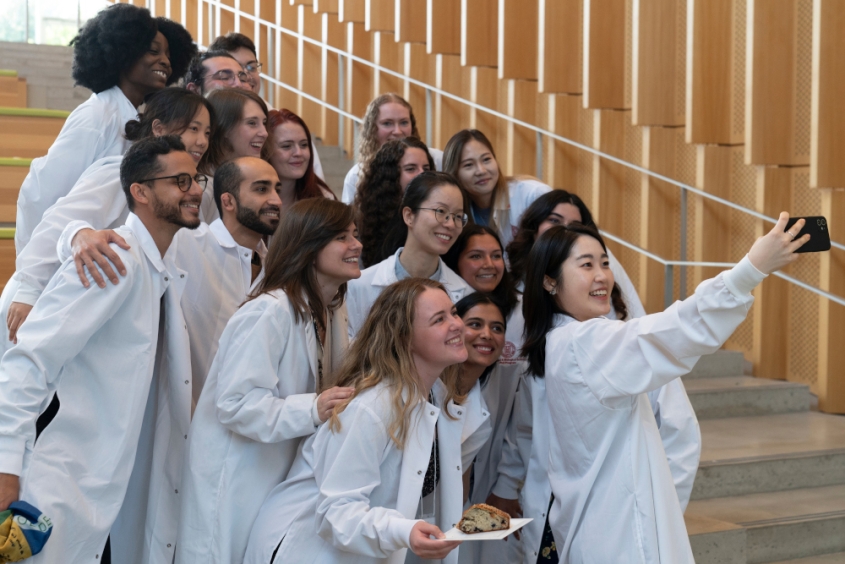Transforming Workforce, Careers and Education
As we look to the future of our role in producing the next generation of practitioners, scientists, public health experts and beyond, we will build on past successes and introduce innovative changes to adapt to a changing world.
Several ambitious goals in this space were set out in the previous strategic plan and by their broad-reaching nature, are still in process. Many of these efforts are close to completion, some have not yet begun, but each remains an integral step towards our goal of transforming our education programs. For the D.V.M. program, we will complete the revitalization of clinical education by redesigning courses to incorporate more active learning methods, included experiences at CUVS and CRES, and increasing workplace-based learning experiences to prepare graduates for day-one practice. Efforts to implement competency-based veterinary education will continue throughout the pre-clinical and clinical curriculum, and the first-year curriculum will undergo some restructuring to facilitate the students’ transition into the veterinary program. Recruitment and admissions are foundational in the success of our educational programs and the careers of our graduates. We will continue our efforts to expand the reach of our recruitment programs, foster diversity in recruitment and create an inclusive and supportive environment for students in all of our degree programs.
In addition to these previous goals, we will also pursue:
Affordability and accessibility
- Continue our efforts to support the students in most financial need and at risk of highest debt levels both for the D.V.M. and M.P.H. degree programs.
Career-ready graduates
- Build a faculty and alumni advising network that will harness this group’s rich knowledge to help our students prepare for their careers in veterinary medicine and public health.
- Support communication and participation in the Alumni Association’s Student Alumni Veterinary Experience (SAVE) program.
- Increase capacity for career advising and job placement Center for Veterinary Business and Entrepreneurship (CVBE) through hiring or volunteer participation. While initially focused on the veterinary profession, this initiative also encompasses improving advising for students in other academic/degree programs.
- Expand primary care experience for veterinary students beyond the Ambulatory and Production Medicine Service, the Small Animal Community Practice (SACP) and Shelter Medicine sections by using first-opinion caseload available through emergency services, chronic care in internal medicine, the wildlife hospital, and urgent care needs in the Equine and Nemo Farm Animal Hospital.
Supporting faculty success
- Appoint a task force to evaluate and define standards of teaching performance for promotions for both tenure-track and research, teaching and extension faculty.
- Expand training opportunities for CVM educators including incorporating teaching/learning topics in the college’s Faculty Development Program, launching a community of educators to support new hires, diversifying instructional feedback mechanisms, and supporting CVM faculty and SUNY colleagues through the Veterinary Educators Academy.
- Offer training for researchers to help them receive NIH Career Development awards and help them develop their research and academic careers.
Responsive educational offerings
- Establish new concentration areas for the M.P.H. program: Emergency Preparedness, Response & Management; and Environment, Climate & Health.
- Develop D.V.M. residency in free-ranging wildlife medicine that addresses ecosystem sustainability, regulatory understanding and individual animal health.
- Establish five postdoctoral positions for One-Health-focused research.
- Expand M.P.S. courses to cover additional disciplines and develop related certificate programs.
- Found a veterinary technician internship program and partner with SUNY schools to create a pipeline for technician students to CVM internships. We will also pursue partnerships with SUNY Licensed Veterinary Technician education programs and the SUNY Binghamton School of Pharmacy and Pharmaceutical Sciences to better coordinate veterinary and related education programs with partners in the SUNY system and address critical New York workforce needs.
- Launch a Ph.D. program in public health and One Health, restructure and reimagine our training in free-ranging wildlife and zoo animal medicine with renewed offerings in D.V.M. clinical rotations and a residency program.
- Participate in Cornell’s Graduate School initiative to better organize life sciences graduate programs.



